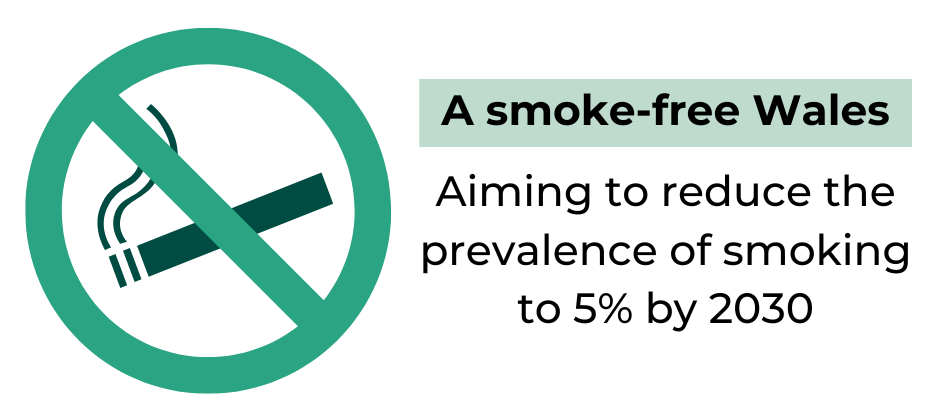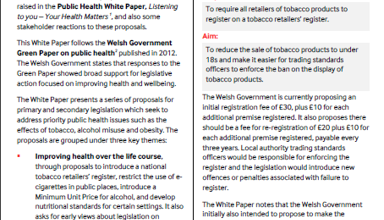As the NHS marks its 75th birthday, this two-part series explores how devolution has shaped health policy in Wales by looking at six key pieces of Welsh legislation and their impact on people’s health and on the NHS.
This first article considers legislation with a public health focus: the indoor smoking ban, minimum unit pricing for alcohol, and the Public Health (Wales) Act 2017.
Our second article, which will be published on Thursday, will explore legislation which impacts on the way health and care services are planned and delivered.
Banning smoking indoors
The Senedd passed legislation in 2007 which banned smoking indoors in public places, including workplaces, pubs and restaurants. This aimed to take action against the danger posed by smoking, not only for smokers themselves but also for people present while they smoke (passive smoking).
The Public Health (Wales) Act 2017 updated this legislation and expanded the ban to some outdoor spaces, such as hospital and school grounds. This came into force in 2021. See more on the 2017 Act below.
The number of smokers in Wales has reduced by 8 percentage points in the last decade, from 22% of the population in 2011/12 to 14% in 2021/22. The Deputy Minister for Mental Health and Wellbeing highlighted this progress:
We have much to be proud of and through our collective efforts in Wales, smoking rates are at the lowest levels since records began – a fantastic achievement in itself.
This progress has had a knock-on effect in reducing smoking-related mortality since the ban was introduced, with an 8% decrease in people dying from conditions related to smoking between 2008/10 and 2016/18. Despite this, smoking remains a leading cause of premature death in Wales.
There is also a big disparity in rates of smoking along socioeconomic lines in Wales, with 22% of people in the most deprived areas being smokers compared to only 5% in the least deprived in 2021/22.
There have been several other initiatives to reduce smoking in Wales since the ban was introduced. NHS Wales launched Help Me Quit, a dedicated service offering guidance and support to people who want to quit smoking, in 2017. Evidence suggests that with the support of such NHS stop smoking services, people are four times more likely to quit.
Last year, the Welsh Government introduced a new strategy to tackle smoking and set a target to make Wales smoke-free by 2030.
The Welsh Government plans to eradicate the harm caused by smoking in Wales by 2030

Source: A smoke-free Wales: Our long-term tobacco control strategy. Welsh Government.
Reducing alcohol-related harm
The Senedd passed legislation in 2018 to introduce a minimum unit price (MUP) for alcohol . This came into force in March 2020, and followed the introduction of similar legislation in Scotland. In both Wales and Scotland, the MUP was set at 50p.
This move made cheap, high-strength alcohol more expensive. It aimed to reduce drinking and associated harm, particularly among people who drink at hazardous and harmful levels.
Prior to the introduction of MUP in Wales, in 2017/18 around 14,600 hospital admissions were as a direct consequence of alcohol misuse. MUP was forecast to reduce hospital admissions and alcohol-attributable deaths, particularly amongst hazardous and harmful drinkers. The World Health Organization has praised MUP policies saying they are:
among the most effective measures that policy-makers can use to address these harms
As part of efforts to judge MUP’s effectiveness, the Welsh Government released a study in June 2023 comparing people’s attitudes to alcohol before and after the change. This found that the proportion of participants drinking at least 2-3 times per week has increased from 28% in 2014 to 38% in 2022. It also reported that 45% of people were now classed as increasing or higher risk drinkers, compared to 38% in 2014.
However, it is difficult to analyse the impact of the legislation without considering the impact of the COVID-19 pandemic, as the Act came into effect just weeks before the first lockdown was announced.
A separate study reported that alcohol sales from small retailers (excluding supermarkets) between September 2019 and February 2022 increased in both Wales and England, where there is no MUP. This suggests there are other factors at play and the increase was more likely to be due to COVID mitigations.
Evaluations of MUP in Scotland, where the policy was introduced prior to the pandemic, may also provide insight into the effectiveness of the policy.
A Public Health Scotland report showed that deaths and hospital admissions as a direct consequence of alcohol consumption reduced by 13% and 4% respectively in the two and a half years after MUP was introduced in 2018. However, Public Health Scotland also reported that alcohol consumption was not significantly reduced in people who drink at harmful levels.
Minimum unit pricing will be reviewed in Wales six years after it came into force at which point the Senedd will vote on whether to keep it.
Public Health Act
The Public Health (Wales) Act 2017 tackled various areas of health concern:
- It expanded on the 2007 smoking ban by banning smoking in certain outdoor areas, as mentioned earlier.
- The Act required the Welsh Government to produce a strategy to tackle obesity. The Healthy Weight, Healthy Wales strategy was subsequently published in 2019. This is in place up to 2030, supported by funding of £13 million across the lifetime of the plan.
- The Act also tightened up rules around licensing for special procedures, including tattooing and piercing. It introduced a mandatory licensing scheme for practitioners carrying out such procedures, the first of its kind in the UK.
- It also introduced a requirement for public bodies to carry out Health Impact Assessments in specific circumstances. These were described by the Welsh Government as “a systematic means of taking health into account as part of decision making and planning processes.”
This was not the first time a version of this legislation had been brought forward. The original Bill, introduced in 2015, contained additional tough regulations on e-cigarettes. If the Bill had passed, smoking e-cigarettes, often referred to as vaping, would have been treated in the same way as tobacco cigarettes, banning their use in enclosed and public places. However, this Bill was rejected at Stage 4 in 2016 and the version that was re-introduced did not contain the provisions on the use of e-cigarettes.
Since the bill passed, experts have expressed concern about the growing use of e-cigarettes by children and young people. Even though it’s illegal to sell e-cigarettes to anyone under 18, a survey from 2021/22 found one in five 11–16-year-olds had tried vaping.
First Minister Mark Drakeford, who was Minister for Health and Social Services at the time, recently reflected in an interview about the failure to pass the ban on e-cigarettes:
Sometimes that's what I regret the most whilst I've been working in the Senedd - there are a number of things I regret - but that would be right at the top on a very short list.
Article by Ailish McCafferty, Senedd Research, Welsh Parliament.
Senedd Research acknowledges the parliamentary fellowship provided to Ailish McCafferty by the Medical Research Council which enabled this research article to be completed.






